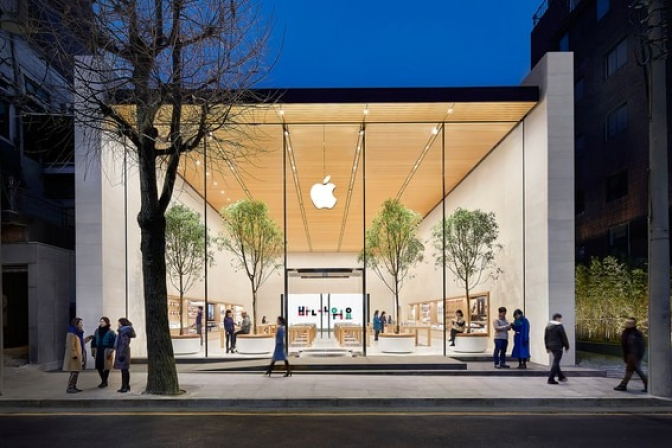Tech, Media & Telecom
Apple ordered to compensate Korean users for iPhone slowdown
A Korean court orders the tech giant to pay seven users $53 each in psychological damages
By Dec 06, 2023 (Gmt+09:00)
2
Min read
Most Read
LG Chem to sell water filter business to Glenwood PE for $692 million


Mirae Asset to be named Korea Post’s core real estate fund operator


KT&G eyes overseas M&A after rejecting activist fund's offer


Meritz backs half of ex-manager’s $210 mn hedge fund


StockX in merger talks with Naver’s online reseller Kream



An appellate court of South Korea on Wednesday ordered Apple Inc. to pay 70,000 won ($53.3) each to seven Korean iPhone users for deliberately slowing the mobile phones' performance.
The court’s rule partially favored the plaintiffs, overturning the lower court’s decision that the plaintiffs’ claim for performance degradation is more of their subjective feeling than a fact.
The appellate court said Apple should have explained to users that its iPhone software update could slow the device's performance.
The controversy dates back to 2017 when iPhone users claimed that their iPhones' performance slowed after the operating system iOS update. The users argued that the tech giant purposedly degraded the device performance to entice them to buy new iPhones.
Apple first denied the intentional slowing down of iPhone batteries, and later the company admitted that it did so to preserve battery life and insisted the update was not aimed at enticing users to purchase new iPhones.
In March 2018, some 62,000 users in Korea filed a lawsuit against Apple Korea and the tech giant’s headquarters. They sought 200,000 won compensation for each plaintiff in property and psychological damages.
The lower court in February of this year ruled against the plaintiffs, saying the evidence submitted by the users was not enough to demand compensation from Apple. Only seven of the plaintiffs appealed the decision.
The appellate court said Apple should compensate users for psychological damages as it infringed on their right to choose.
“The plaintiffs would have believed that the iOS update would improve their iPhones’ performance. As Apple would limit the central processing unit (CPU) performance of the expensive device, the company should have provided sufficient explanation to the users, allowing them to choose whether to install the update or not,” the court said.
The court, however, didn’t accept the plaintiffs’ argument on property damages.
The performance throttling features of the update only partially limit the CPU and graphic processing unit (GPU) performance under certain conditions where powering off is likely to occur, and it is difficult to conclude that the update permanently restricted the iPhones' performance, the court said.
Write to Si-On Park at ushire908@hankyung.com
Jihyun Kim edited this article.
More to Read
-
 AutomobilesBMW surpasses Mercedes in Korean sales for 1st time in 10 years
AutomobilesBMW surpasses Mercedes in Korean sales for 1st time in 10 yearsMay 02, 2025 (Gmt+09:00)
-
 Business & PoliticsTrump Jr. meets Korean business chiefs in back-to-back sessions
Business & PoliticsTrump Jr. meets Korean business chiefs in back-to-back sessionsApr 30, 2025 (Gmt+09:00)
-
 Korean chipmakersSamsung in talks to supply customized HBM4 to Nvidia, Broadcom, Google
Korean chipmakersSamsung in talks to supply customized HBM4 to Nvidia, Broadcom, GoogleApr 30, 2025 (Gmt+09:00)
-
 EnergyLS Cable breaks ground on $681 mn underwater cable plant in Chesapeake
EnergyLS Cable breaks ground on $681 mn underwater cable plant in ChesapeakeApr 29, 2025 (Gmt+09:00)
-
 Business & PoliticsUS tariffs add risk premium to dollar assets: Maurice Obstfeld
Business & PoliticsUS tariffs add risk premium to dollar assets: Maurice ObstfeldApr 29, 2025 (Gmt+09:00)
Comment 0
LOG IN


